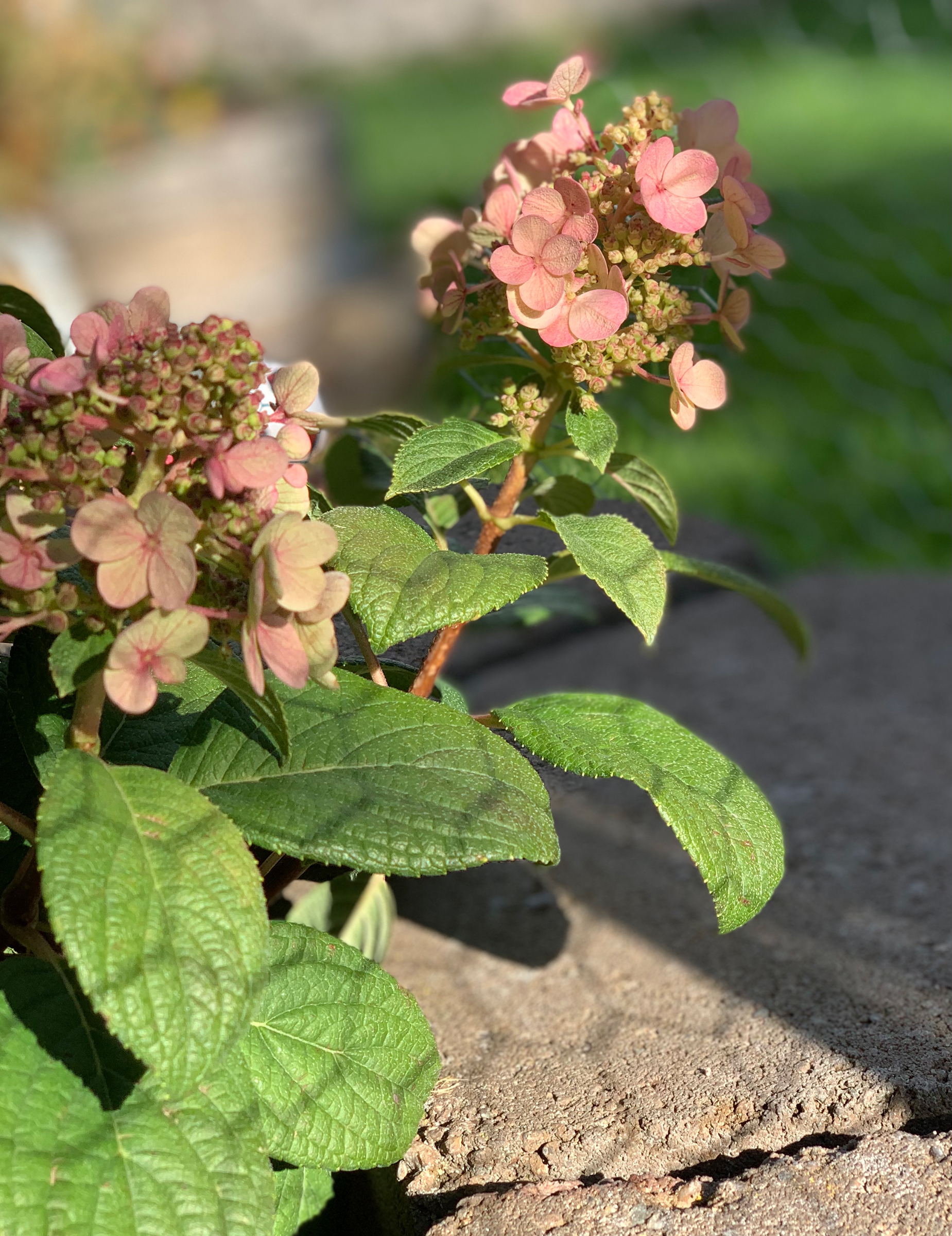I stood, gardening gloves still covered in dirt from digging out the last of the hole with my hands, and let out the breath I didn’t realize I’d been holding. My husband walked over and put his hand on the small of my back.
“I guess that’s deep enough,” I said.
“I think so.” He rubbed my whole back then. I leaned into him, glancing up at the sliding glass door. Our three daughters, two my own and one his, sat at the dining-room table covered in paints and canvases—something I made sure to supply them with since we’d hunkered down at home in March. The oldest looked up at me, but I quickly looked down at the fresh dirt again.
“Should I go get it?” he said.
We’d talked through the final part of the plan several times. Yesterday my husband made a small box out of rough-cut pine. That morning we picked out the hydrangea to plant over it, which now sat at my feet. At my nod, he knew to take the box into the house, grab my favorite, old bandana out of a drawer in the bathroom, and go to the freezer in the garage. In the quiet, stuffy, dimly lit room full of unpacked boxes, he’d take the remains from my last pregnancy, the result of my third miscarriage in six months, and gently wrap it in the bandana before sealing the box.
“I don’t want to see it again,” I’d said. Images of the bloody toilet, of my arm encased in a garbage bag, blindly reaching into the dark water to pull out a piece of tissue that filled my whole palm still played too often in my head. I’d spent two days sitting on my bathroom floor. I’d had a panic attack over how much blood had poured out of me. Twice.
He returned from the garage and I asked him to stop for a second before placing the box in the ground. “Here, let me take a picture,” I said, and he held the box out in his hands.
We both covered the box with a few handfuls of compost before placing the hydrangea—a dwarf version called a Little Quick Fire—in the deep hole.
“We should get a plaque for it that says, ‘Ellis’s Hydrangea,’” he said. I hugged him from the side.
“Should we say anything?”
“No,” he said. “We’ve said everything we need to.”
I nodded and hugged him tighter. The night before, I sat on the side of the bed staring at the floor. He asked what I was thinking about and I started crying.
“Maybe we should, I don’t know, talk to Ellis?”
“O.K.,” he said.
My husband and I, both atheists, reached for each other’s hands to hold, bowed our heads and closed our eyes. For the next several minutes, I said in the still space of our bedroom that it’s O.K. it didn’t work out with us. We understood and wished them well. I told Ellis I loved them so, so much.
All of this went against my nature. I believe in the right to choose. I have chosen to end a pregnancy before. I don’t believe life begins at conception. My pregnancy had ended at five weeks, and I didn’t know that until my eight-week ultrasound. It took two rounds of medication for my body to finally let go of it when I was 12 weeks along. It was a blastocyst, not a baby named Ellis.
I’d been so confident this time. Third time was the charm. This one felt different. I’d even announced that I was pregnant on social media at five weeks. I wanted to be able to announce. I wanted to celebrate. I didn’t want to talk about my pregnancy in past tense like I had twice before. I didn’t want to share only the grief.
When I typed up the words to announce my third miscarriage, the response was immediate. Many, by default, said the words “I’m sorry,” which made me want to scream. People offered unsolicited medical and spiritual advice. Then the messages came by the dozens. They filled every inbox I had.
Then I tweeted that my lost pregnancy had a name and asked, “What was your unborn’s name?” A few days later, I pulled my husband aside to a quiet place where I read names out loud. “Oliver, Quinn, Hannah, Olivia, Birdie, Pearl and Wren.” There must have been at least 200. I said them out loud not only to honor them, but to comfort myself. Knowing others had names for their embryos, zygotes and fetuses somehow brought with it a validation and permission at the same time. I could grieve in whatever way I needed. If that meant burying a box full of remains I’d assigned the name of Ellis, then that was perfectly O.K.
My arm fell from my husband’s back, and I put both hands in my pockets. I closed my eyes, standing there, head tilted down toward our newly planted Little Quick Fire. I thought of those names, and the parents who’d loved them so fiercely. I wasn’t alone. They were all there beside me.
- The 100 Most Influential People of 2024
- Coco Gauff Is Playing for Herself Now
- Scenes From Pro-Palestinian Encampments Across U.S. Universities
- 6 Compliments That Land Every Time
- If You're Dating Right Now, You're Brave: Column
- The AI That Could Heal a Divided Internet
- Fallout Is a Brilliant Model for the Future of Video Game Adaptations
- Want Weekly Recs on What to Watch, Read, and More? Sign Up for Worth Your Time
